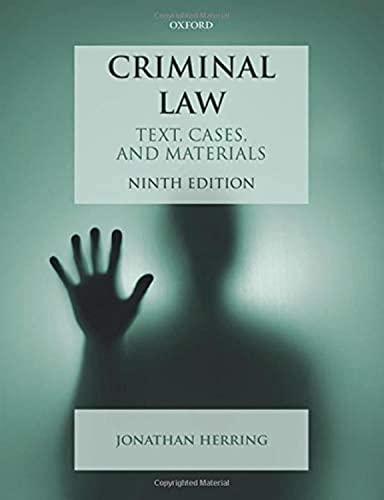Question
Frank Fashion and Holly Hip were each involved in the men's fashion industry, Frank as a wholesaler and Holly as a retailer. Though the two
Frank Fashion and Holly Hip were each involved in the men's fashion industry, Frank as a wholesaler and Holly as a retailer. Though the two of them had never met before, they struck up a conversation while both were attending a men's clothing convention in Chicago, where both of them resided. As the conversation progressed, Holly was excited to learn that Frank sold men's coats on a wholesale basis. Holly owned a retail store that sold men's clothing, including coats, and she had been searching for a new supplier of coats for her store. After Holly mentioned this need to Frank, the two of them struck an oral agreement with the following terms: Frank would sell Holly three dozen men's suede coats at $600 per dozen, with Frank to deliver the coats to Holly's store in five weeks.
About a week after this agreement had been made, Holly received the following letter from Frank:
"Dear Holly,
This letter is to confirm the terms of the arrangement we made a week ago. I agreed to sell you two dozen men's leather coats for $600 per dozen, delivery to be made by me to you five weeks from the date of our deal. Any disputes in our contract will be subject to arbitration. This acceptance of your offer to purchase is expressly made conditional on your assent to any different or additional terms contained in this letter.
(signed) Frank Fashion."
When Holly received this letter, she was puzzled about a number of things. First, she was certain that she and Frank had agreed to a deal of three dozen, not two dozen, coats (and Holly even had several acquaintances in the industry who had witnessed the oral agreement that was struck and who said they would confirm Holly's version of events). Second, Holly was equally certain that she had ordered suede, not leather, coats. Finally, neither Frank nor Holly had ever mentioned anything about arbitration. During the next few weeks, Holly tried unsuccessfully to reach Frank by telephone to clear up these matters. When Holly finally did talk to Frank, a week before performance was due, Frank insisted that it was Holly whose memory was faulty as to the number and type of coats. Further, Frank said that although he didn't mention it at the time, he always insisted on an arbitration clause in his contracts because he hated "those crowded courts."
After having this conversation with Frank, Holly immediately called up her friend and lawyer, Bertha Barrister. Holly explained to Bertha all of the above facts (including the fact that performance was due in one week) and asked Bertha for the answer to three related questions: 1.) to what extent could Holly enforce the agreement if she wanted to enforce it but Frank wanted to avoid it; 2.) to what extent could Frank enforce the agreement if he wanted to enforce it but Holly wanted to avoid it; and 3.) in either event, what would be the terms of the contract.
Discuss how Bertha should advise Holly on each of these issues.
Step by Step Solution
There are 3 Steps involved in it
Step: 1

Get Instant Access to Expert-Tailored Solutions
See step-by-step solutions with expert insights and AI powered tools for academic success
Step: 2

Step: 3

Ace Your Homework with AI
Get the answers you need in no time with our AI-driven, step-by-step assistance
Get Started


